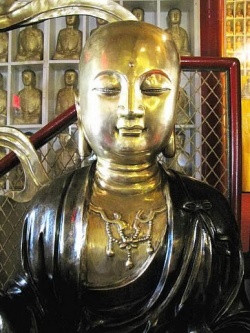Difference between revisions of "Treatise on the Treasure Vehicle of Buddhahood"
| Line 1: | Line 1: | ||
[[File:Kshitigarbha.38.jpg|thumb|250px|]] | [[File:Kshitigarbha.38.jpg|thumb|250px|]] | ||
<poem> | <poem> | ||
| − | Treatise on the | + | [[Treatise on the Treasure Vehicle of Buddhahood]], The |
| − | [[究竟一乗宝性論]] (Skt [[Ratnagotravibhaga-mahayanottaratantra-shastra]]; Chin [[Chiu | + | [[究竟一乗宝性論]] (Skt [[Ratnagotravibhaga-mahayanottaratantra-shastra]]; Chin [[Chiu-ching-i-ch’eng-pao-hsing-lun]]; Jpn [[Kukyo-ichijo-hosho-ron]] ) |
| − | A work by [[Saramati]], a [[Mahayana]] [[scholar]] of [[India]], translated into {{Wiki|Chinese}} in the sixth century by [[Ratnamati]]. It asserts that all [[beings]] possess the "{{Wiki|matrix}} of the [[Thus]] | + | A work by [[Saramati]], a [[Mahayana]] [[scholar]] of [[India]], translated into {{Wiki|Chinese}} in the sixth century by [[Ratnamati]]. It asserts that all [[beings]] possess the "{{Wiki|matrix}} of the [[Thus Come One]]" (Skt [[Tathagata-garbha]], also called the {{Wiki|matrix}} of the [[Tathagata]]) or the [[Buddha nature]], and that even [[icchantikas]], persons of incorrigible disbelief, can attain [[Buddhahood]] eventually. This treatise is generally [[Thought]] to have been written sometime around the end of the fourth or the beginning of the fifth century. [[Tibetan tradition]] [[attributes]] the verses of this work to [[Maitreya]] and commentaries on them to [[Asanga]]. [[Maitreya]] and [[Asanga]] were also [[Mahayana]] [[scholars]]. |
</poem> | </poem> | ||
{{R}} | {{R}} | ||
Latest revision as of 19:20, 16 April 2014
Treatise on the Treasure Vehicle of Buddhahood, The
究竟一乗宝性論 (Skt Ratnagotravibhaga-mahayanottaratantra-shastra; Chin Chiu-ching-i-ch’eng-pao-hsing-lun; Jpn Kukyo-ichijo-hosho-ron )
A work by Saramati, a Mahayana scholar of India, translated into Chinese in the sixth century by Ratnamati. It asserts that all beings possess the "matrix of the Thus Come One" (Skt Tathagata-garbha, also called the matrix of the Tathagata) or the Buddha nature, and that even icchantikas, persons of incorrigible disbelief, can attain Buddhahood eventually. This treatise is generally Thought to have been written sometime around the end of the fourth or the beginning of the fifth century. Tibetan tradition attributes the verses of this work to Maitreya and commentaries on them to Asanga. Maitreya and Asanga were also Mahayana scholars.
